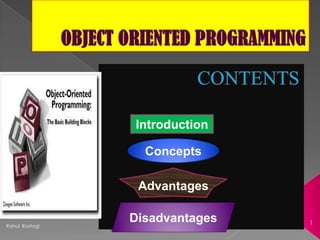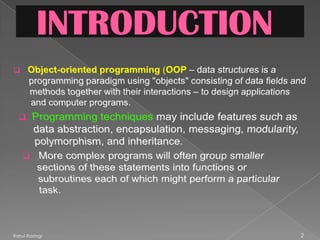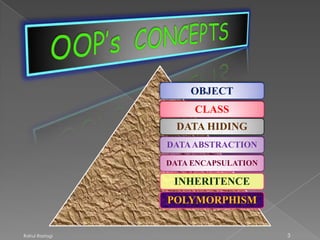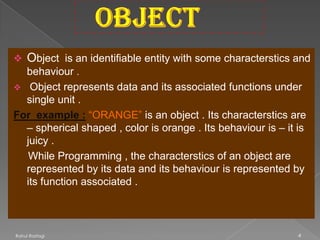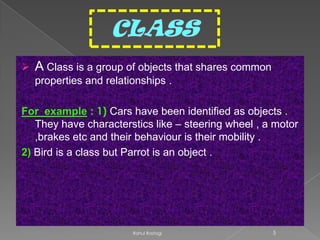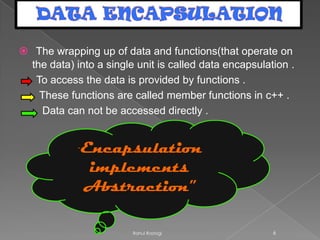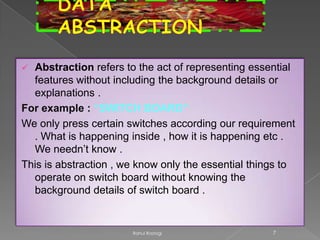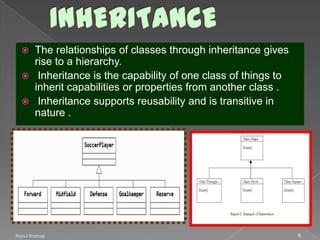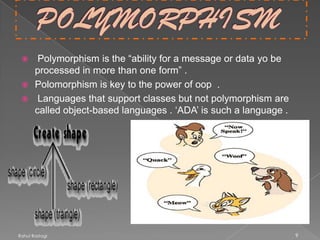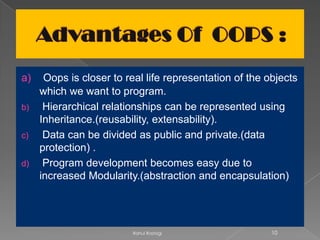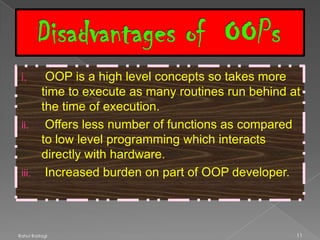Object oriented programming
- 1. Introduction Concepts Advantages Rahul Rastogi Disadvantages 1
- 2. Rahul Rastogi 2
- 3. OBJECT CLASS DATA HIDING DATA ABSTRACTION DATA ENCAPSULATION INHERITENCE POLYMORPHISM Rahul Rastogi 3
- 4. ’üČ Object is an identifiable entity with some characterstics and behaviour . ’üČ Object represents data and its associated functions under single unit . For example : ŌĆ£ORANGEŌĆØ is an object . Its characterstics are ŌĆō spherical shaped , color is orange . Its behaviour is ŌĆō it is juicy . While Programming , the characterstics of an object are represented by its data and its behaviour is represented by its function associated . Rahul Rastogi 4
- 5. ’āś A Class is a group of objects that shares common properties and relationships . For example : 1) Cars have been identified as objects . They have characterstics like ŌĆō steering wheel , a motor ,brakes etc and their behaviour is their mobility . 2) Bird is a class but Parrot is an object . Rahul Rastogi 5
- 6. ’é× The wrapping up of data and functions(that operate on the data) into a single unit is called data encapsulation . To access the data is provided by functions . These functions are called member functions in c++ . Data can not be accessed directly . ŌĆ£Encapsulation implements AbstractionŌĆØ Rahul Rastogi 6
- 7. ’ā╝ Abstraction refers to the act of representing essential features without including the background details or explanations . For example : ŌĆ£SWITCH BOARDŌĆØ We only press certain switches according our requirement . What is happening inside , how it is happening etc . We neednŌƤt know . This is abstraction , we know only the essential things to operate on switch board without knowing the background details of switch board . Rahul Rastogi 7
- 8. ’é× The relationships of classes through inheritance gives rise to a hierarchy. ’é× Inheritance is the capability of one class of things to inherit capabilities or properties from another class . ’é× Inheritance supports reusability and is transitive in nature . Rahul Rastogi 8
- 9. ’é× Polymorphism is the ŌĆ£ability for a message or data yo be processed in more than one formŌĆØ . ’é× Polomorphism is key to the power of oop . ’é× Languages that support classes but not polymorphism are called object-based languages . ŌĆ×ADAŌƤ is such a language . Rahul Rastogi 9
- 10. a) Oops is closer to real life representation of the objects which we want to program. b) Hierarchical relationships can be represented using Inheritance.(reusability, extensability). c) Data can be divided as public and private.(data protection) . d) Program development becomes easy due to increased Modularity.(abstraction and encapsulation) Rahul Rastogi 10
- 11. i. OOP is a high level concepts so takes more time to execute as many routines run behind at the time of execution. ii. Offers less number of functions as compared to low level programming which interacts directly with hardware. iii. Increased burden on part of OOP developer. Rahul Rastogi 11
- 12. Rahul Rastogi 12

